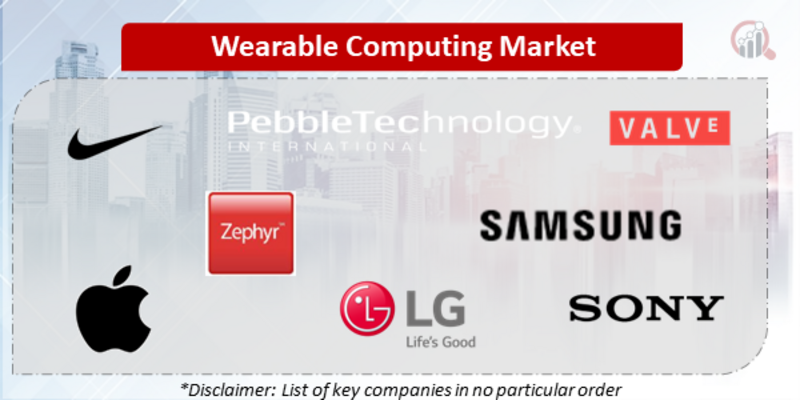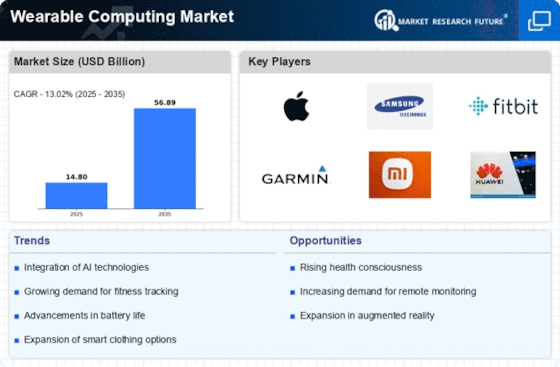Top Industry Leaders in the Wearable Computing Market

Competitive Landscape of Wearable Computing Market:
The wearable computing market, encompassing smartwatches, fitness trackers, AR glasses, and other intelligent devices worn on the body, is experiencing a surge in growth. Boosted by rapid technological advancements, increasing health consciousness, and the rise of the Internet of Things (IoT). However, within this dynamic landscape, a fierce competition reigns, with established giants jostling for dominance alongside innovative startups vying for a niche.
Strategies Adopted by Key Players:
- Innovation: Constant development of new features and functionalities is crucial for staying ahead. Integration with AI, advanced health monitoring capabilities, and seamless connectivity with smart homes are key areas of focus.
- Ecosystem Building: Creating a cohesive ecosystem that seamlessly integrates wearables with other devices and services strengthens user engagement and loyalty. Apple Watch's tight integration with iPhones and Samsung's Galaxy ecosystem are prime examples.
- Customization: Offering personalization options and catering to diverse user preferences is vital. From swappable bands to user-defined watch faces and health dashboards, customization fosters a sense of ownership and individuality.
- Affordable Options: While premium devices garner attention, offering accessible and feature-rich wearables at competitive prices expands reach and attracts new customer segments.
Factors for Market Share Analysis:
- Product Portfolio: The breadth and depth of offerings cater to different needs and price points. Companies with diverse portfolios covering various segments hold an advantage.
- Brand Recognition: Established brands with strong reputations enjoy an edge over new entrants. Effective marketing and brand building strategies are essential for attracting customers.
- Technological Advancements: Pioneering innovative features and functionalities creates differentiation and attracts early adopters. Continuous research and development are crucial for staying ahead.
- Global Reach: Efficient distribution networks and localization strategies are key for penetrating international markets.
New and Emerging Companies:
- VR/AR Players: Companies like Meta and Google are developing AR wearables like smart glasses, poised to revolutionize various industries from healthcare to manufacturing.
- Health-Tech Startups: Companies like Oura Ring and Biostrap are focusing on advanced health monitoring and sleep tracking, offering personalized insights and data-driven wellness solutions.
- Fashion Tech Brands: Collaboration between tech companies and fashion houses like Kate Spade and Tory Burch is creating stylish and functional wearables, blurring the lines between technology and fashion.
Latest Company Updates:
Nike Inc.:
- October 2023: Nike acquires RunRepeat, a data-driven platform for recommending running shoes, indicating their commitment to personalized athletic experiences.
- December 2023: Nike partners with WHOOP, a performance tracking platform, to develop personalized training programs for athletes.
- Expected 2024: Launch of Nike's next-generation FuelBand, incorporating advanced biometrics and personalized coaching features.
Pebble Technology Corporation:
- 2016: Pebble acquired by Fitbit, marking the end of Pebble's independent operations.
- 2017: Fitbit discontinues all Pebble products.
- 2022: A crowdfunding campaign launched to revive the Pebble brand with a new smartwatch.
- 2023: No significant updates on the revived Pebble project.








